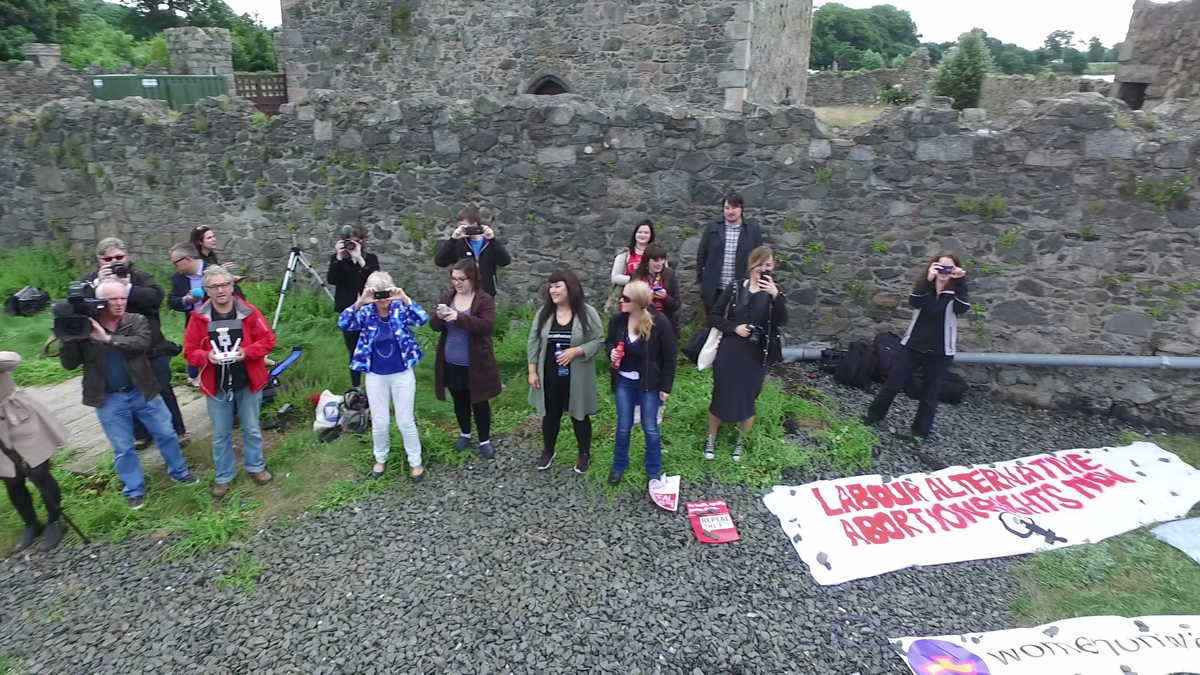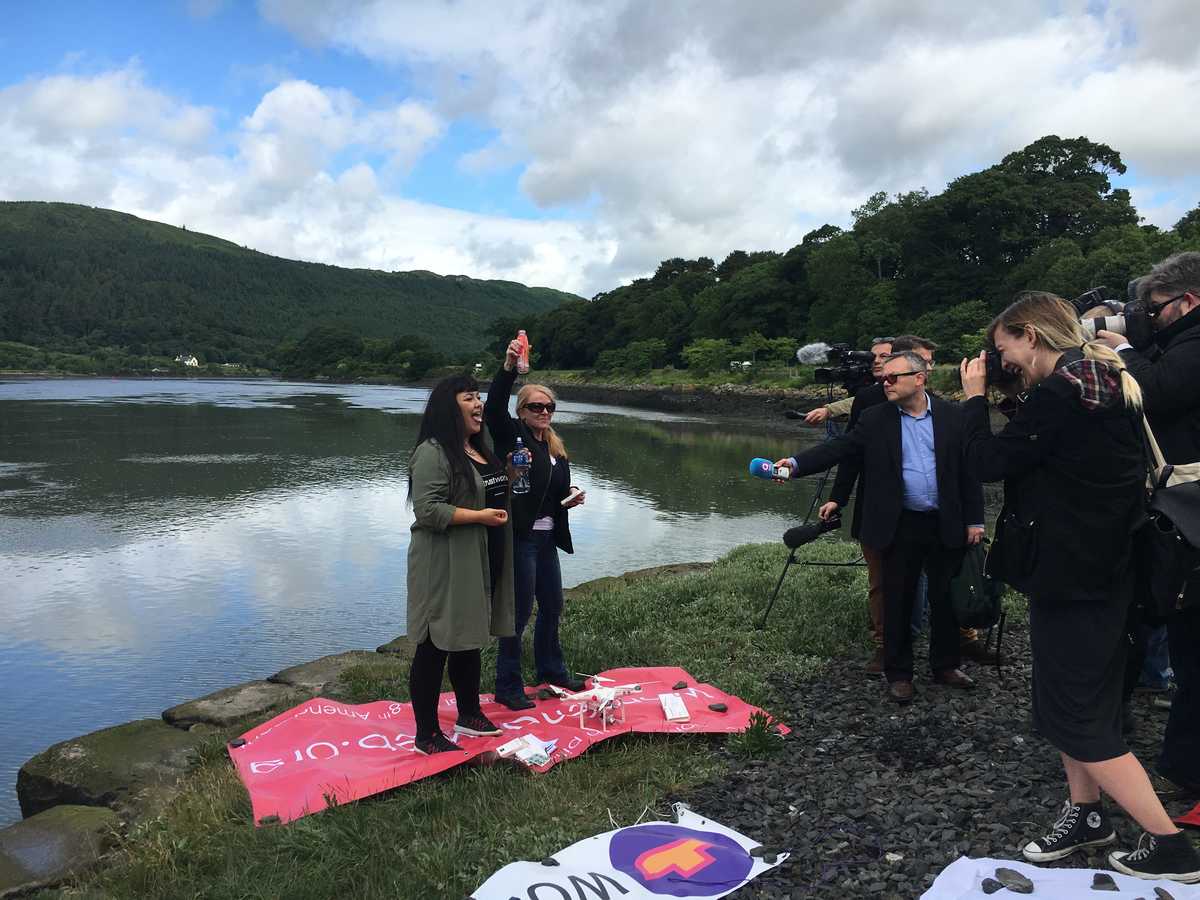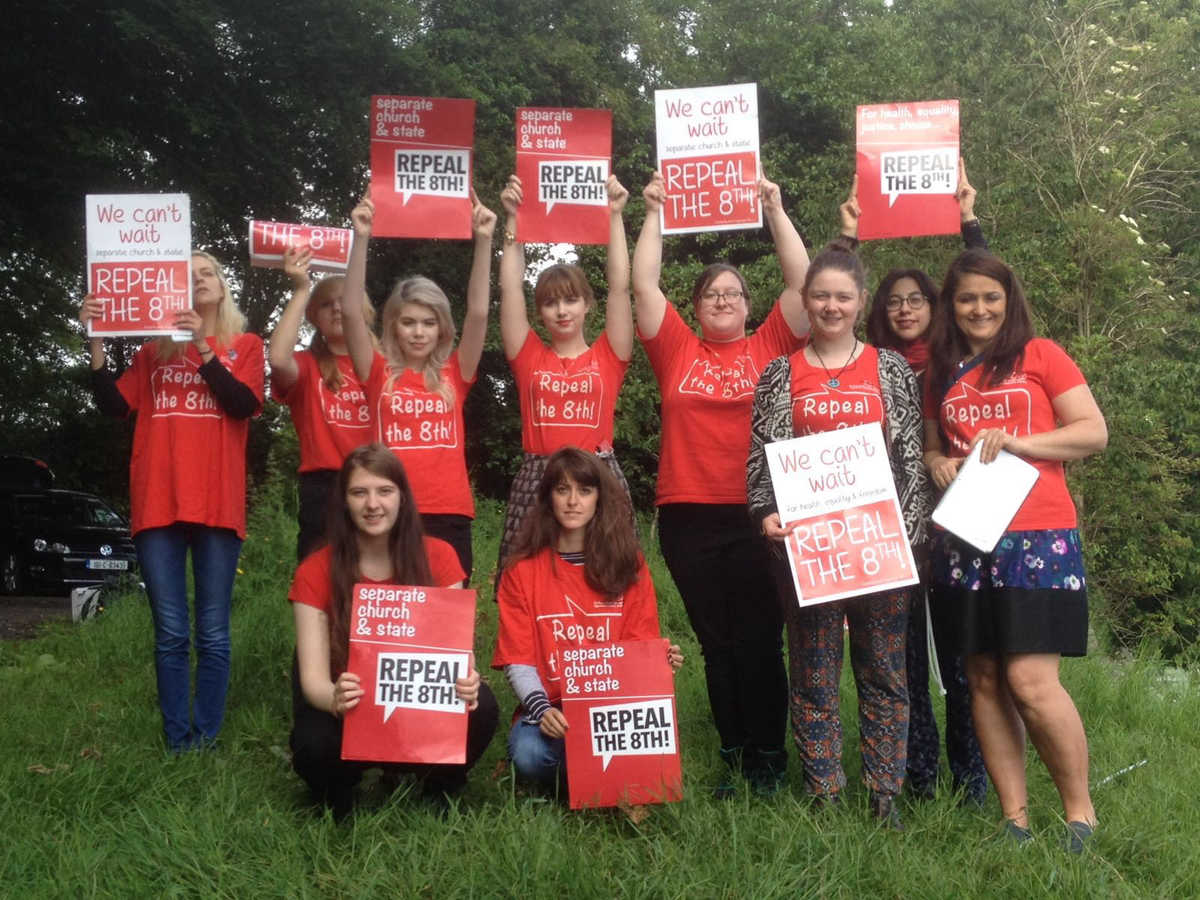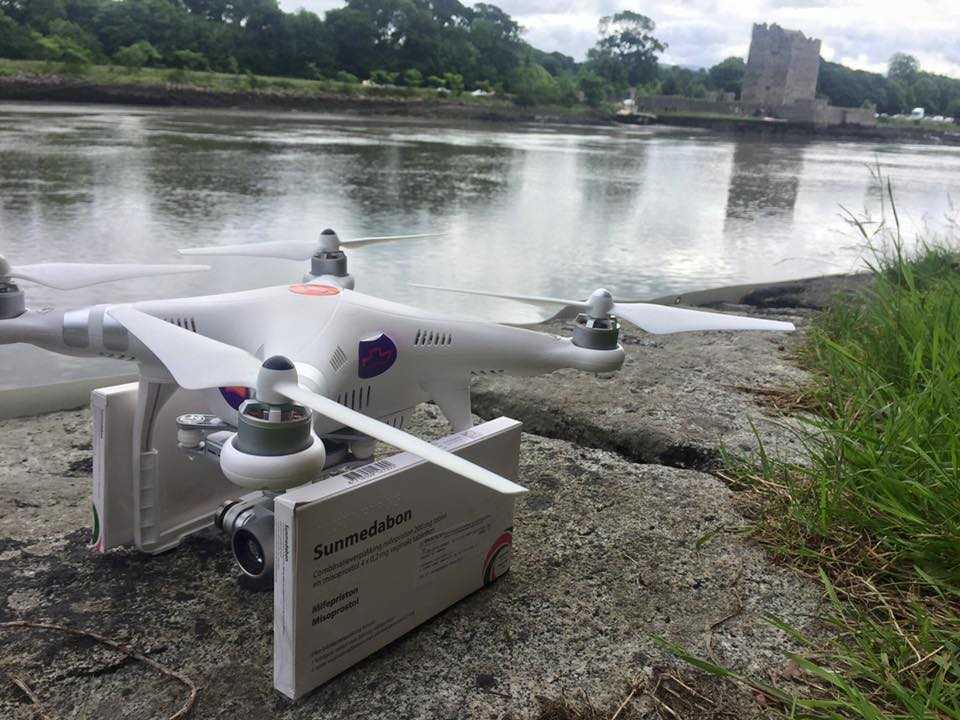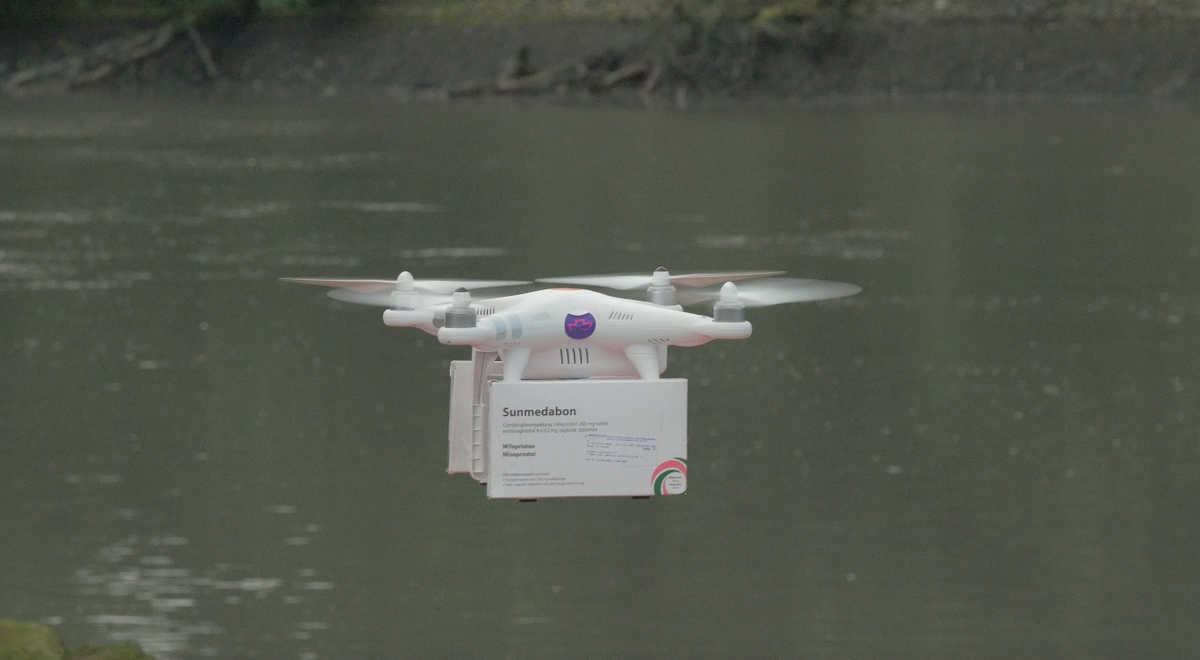Abortion drone Ireland, 2016
June 21 th, 2016. The Abortion Drone flew from the Republic of Ireland to Northern Ireland at Narrow Waters Castle. After the drone landed safely two women took the pills. At the same time Women on Waves employed a RC speedboat to send over more pills for the women. Making abortion illegal will not keep women from accessing abortion pills, by ship, by mail, through the internet, drone or RC speedboat!
Footage of the Abortion Drone can be provided on request, please email info@womenonwaves.org
Courtney Robinson of Labour Alternative and one of the women who swallowed the pills states: “Information whether I am pregnant or not is protected by my right to privacy. The right to safe abortion should be a private matter but by criminalising it has instead become a political issue. I have the human right to access and use these medicines.”
Rita Harrold from Rosa states: "Abortion is criminalised in both Northern Ireland and the Republic. We sent the pills across the border today as an act of solidarity with women in NI who are currently facing prosecutions. This is outrageous. Today's action is a clear message of intent - North and South we will build an unstoppable movement of women and young people until women have the right to control their own bodies."
Dr. Rebecca Gomperts from Women on Waves stated: "Research by the world health organisation has proven that an abortion with pills can be done safely at home by women themselves till 10 weeks of pregnancy. The health impact is similar to a miscarriage. Restrictive abortion laws will not keep women from accessing abortion pills, by ship, by mail, through the internet, drone or RC speedboat!"
The medicines needed for a medical abortion are mifepristone and misoprostol, which is listed as an essential medicine by the World Health Organization since 2005. The right to access essential medicines, including abortion pills is protected by many Human rights agreements.
For more information, please contact:
Labour Alternative
Spokes person: Courtney Robinson: +44- 7470047524
courtneysocyouth@gmail.com
https://www.facebook.com/LabourAlternative/
Rosa
Spokes person: Rita Harrold: +353872995484
rosacampaign2013@gmail.com
Women on Waves
+31624195506
+31652052561
+33753719313
1- The right to privacy as stated under Article 12 of the Universal Declaration of Human Rights:
“No one shall be subjected to arbitrary interference with his privacy, family, home or correspondence, nor to attacks upon his honor and reputation. Everyone has the right to the protection of the law against such interference or attacks.”
2- Human right to health and access essential medicines
The World Health Organization’s definition of health is: “Health is a state of complete physical, mental and social well-being, and not merely the absence of disease or infirmity”.[3]
The WHO listed mifepristone and misoprostol as essential medicines since 2005 [4]
Access to essential medicines as part of the right to the highest attainable standard of health ("the right to health") is well-founded in numerous international human rights treaties, such as: the Universal Declaration of Human Rights: Article 25.1 in 1948; the International Convention on the Elimination of All Forms of Racial Discrimination; Article 5 (e) (iv) in 1965; the International Covenant on Economic, Social and Cultural Rights: Article 12.1 in 1966; the Convention on the Elimination of All Forms of Discrimination against Women; Articles 11 (1) (f), 12 and 14 (2) (b) in 1979; the 1989 Convention on the Rights of the Child; Article 24; the International Convention on the Protection of the Rights of All Migrant Workers and Members of Their Families; Articles 28, 43 (e) and 45 (c) in 1990, and the Convention on the Rights of Persons with Disabilities: Article 25 in 2006.
The authoritative General Comment 14 (2000) further applies the principles of accessibility, availability, appropriateness and assured quality to goods and services, which include essential medicines "as defined by the WHO Action Programme on Essential Drugs".[5]
In October 2011, Anand Grover, the UN Special Rapporteur on the Right to Health, submitted a report to the UN General Assembly which stated, “Criminal laws penalizing and restricting induced abortion are the paradigmatic examples of impermissible barriers to the realization of women's right to health and must be eliminated. These laws infringe women's dignity and autonomy by severely restricting decision-making by women in respect of their sexual and reproductive health”.
General comment No. 22 (2016) on the right to sexual and reproductive health (article 12 of the International Covenant on Economic, Social and Cultural Rights) states that, “Essential medicines should also be available, including a wide range of contraceptive methods, such as condoms and emergency contraception, medicines for abortion and for post-abortion care, and medicines, including generic medicines, for the prevention and treatment of sexually transmitted infections and HIV.”[6]
3- Responsibility of states to refrain from limiting access to health
States are under the positive obligation to respect the right to health by refraining from limiting access to contraceptives and other means of maintaining sexual and reproductive health such as medical abortions.
The General Comment of the Committee on Economic Social and Cultural Rights on the right to the highest attainable standard of health in the International Covenant on Economic, Social and Cultural Rights paragraph 42 states: “While only States are parties to the Covenant and thus ultimately accountable for compliance with it, all members of society - individuals, including health professionals, families, local communities, intergovernmental and non-governmental organizations, civil society organizations, as well as the private business sector - have responsibilities regarding the realization of the right to health. State parties should therefore provide an environment which facilitates the discharge of these responsibilities. [7]
General comment No. 22 (2016) on the right to sexual and reproductive health (article 12 of the International Covenant on Economic, Social and Cultural Rights) states that:
39. States parties have an obligation to respect, protect and fulfill the right of everyone to sexual and reproductive health.
Obligation to respect
40. The obligation to respect requires States to refrain from directly or indirectly
interfering with the exercise by individuals of the right to sexual and reproductive health. ….
41. The obligation to respect also requires States to repeal, and refrain from enacting,
laws and policies that create barriers in access to sexual and reproductive health services.[8]
Background information
Abortion reality in Ireland
In Ireland, section 22.1 of the Protection of Life during Pregnancy Act 2013 states that ‘it shall be an offence to intentionally destroy unborn human life’ except in circumstances where, with regard to the mother, there is: A risk of loss of life from physical illness; risk of loss of life from physical illness in case of emergency; or risk of loss of life from risk of suicide. This Act stems from the 8th Amendment to the Irish Constitution.
Thousands of women travel abroad to obtain an abortion.
Given that Section 59 of the Offences against the Person Act 1861 was repealed as a result of the Protection of Life during Pregnancy Act 2013 and subsequently not replaced, it is not illegal to supply or procure authorised medication.
On June 9 th, The UN Committee found Ireland’s abortion laws violates a woman’s basic human rights and called on Ireland to “amend its law on voluntary termination of pregnancy, including if necessary its Constitution, to ensure compliance with the Covenant, including effective, timely and accessible procedures for pregnancy termination in Ireland, and take measures to ensure that health-care providers are in a position to supply full information on safe abortion services without fearing being subjected to criminal sanctions.”
However the Irish government continues to refuses to take action.
Abortion reality in Northern Ireland
The UK’s Abortion Act 1967 does not extend to Northern Ireland and the north’s abortion laws are still governed by sections 58 and 59 of the Offences Against the Person Act. It is unlawful to perform an abortion in Northern Ireland except in very limited circumstances, namely: to preserve the life of the woman; or, a risk of real and serious adverse effect on the woman’s physical or mental health, which is either long term or permanent, as established by case law.
The Belfast High Court ruled that laws governing abortion in Northern Ireland are in breach of Article 8 of the European Convention on Human Rights.
Still, women face life imprisonment for a health service freely provided on the NHS elsewhere in the UK and recently a young women was given a three-month sentence suspended for two years for doing her own abortion with pills and another court case is pending.
However UK’s laws concerning e-health do apply in Northern Ireland. The drone will contain a legal electronic prescription from EU registered doctor with the medicines.
The person receiving the drone is importing the medicines mifepristone and misoprostol for personal use as is allowed under UK legislation.
Both Misoprostol and Mifepristone are authorised medications in the UK.
Abortion pills
The medicines used for a medical abortion, mifepristone and misoprostol, have been on the list of essential medicines of the WHO since 2005 and are available in almost all other European countries.
Scientific research by the World health Organisation has shown that medical abortion can easily be done by women themselves at home without supervision by health professionals. A medical abortion has the same health impact as a spontaneous miscarriage. Usually women themselves handle a miscarriage without additional medical supervision.
For pregnancies of up to 9 weeks (63 days) a medical abortion is done:
1- A woman swallows 1 tablet of 200 mg Mifepristone
2- 24 hours later the woman can put 4 tablets (800 μg) of misoprostol under the tongue (sublingual).
Abortion drone
As the Abortion drone is not used for any commercial purposes, will stay within the sight of the person flying it, does not fly within 50 meters of any vessel, vehicle or structure which is not under the control of the person in charge of the aircraft; does not fly within 150 meters of congested area; and does not fly in controlled airspace, no authorization is required under UK or Irish law. The drone is registered with the IAA.
[4]http://apps.who.int/iris/bitstream/10665/93142/1/EML_18_eng.pdf
[5]http://www.who.int/medicines/areas/human_rights/en/
http://apps.who.int/gb/bd/PDF/bd47/EN/constitution-en.pdf?ua=1
[6]http://www.ohchr.org/EN/NewsEvents/Pages/DisplayNews.aspx?NewsID=17168&LangID=E#sthash.MfGe1y5D.XSS87v3P.dpuf
[7]http://www.who.int/hhr/Series_3%20Non-State_Actors_Clapham_Rubio.pdf,
[8]http://www.ohchr.org/EN/NewsEvents/Pages/DisplayNews.aspx?NewsID=17168&LangID=E#sthash.MfGe1y5D.XSS87v3P.dpuf
Abortion Drone; flight to Northern Ireland
For immediate release:
On Tuesday 21 June, 2016 at 10.00 am the abortion…
Netherlands: new law that allows the abortion pill by GP's, 2022
Finally in December 2022, the Dutch senate approved a new law that will allow…
Abortion Robot on Stage in Poland
December 2018,
On the invitation of director Maja Kleczewska and CHOTKOWSKI…
Abortion Pill Protest in Seoul, South Korea 2018
For immediate release:
26-8-2018: Today 125 women swallowed the abortion pill in…
Abortion Robot in Belfast, Northern Ireland 2018
Operated from Amsterdam, the abortion robot successfully delivered abortion…
Abortion ship Mexico, April 2017
Women on Waves arrived in Ixtapa on April 19 th on the invitation of more than…
Abortion ship Guatemala, February 2017
In collaboration with women's rights organisations in Guatemala, the abortion…
Abortion ship Morocco 2012
MALI (alternative movement for individual liberties) invited Women on Waves to…
Safe Abortion Hotline Indonesia 2011
More than 130 people participate in flashmob in Jogjakarta to launch safe…
Abortion ship Spain 2008
Women on Waves visited Spain from October 16 till 21, 2008 at the invitation of…
Abortion ship Portugal 2004
The Women on Waves ship Borndiep stayed in international waters, 12 miles from…
Abortion ship Ireland 2001
On 11 June 2001, Women on Waves set sail from the Netherlands with an almost…
Safe Abortion Hotline Venezuela 2011
On May 18th, a safe abortion hotline was launched at the Nuevo Circo in Caracas
Misoprostol hotline Pakistan, 2010
A new hotline has been launched in Pakistan that gives information about how…
Safe abortion hotline Argentina July 2009
In Argentina abortion is illegal in most cases. There are about 500,000…
Safe abortion hotline Ecuador, June 2008
The Coordinadora Juvenil por la Equidad de Género (Youth Committee for Gender…
WoW at Creative Times in New York!
Women on Waves gave a presentation at Creative Times and participated in the…
Stir in Argentina 2004
On December 8, 2004, Rebecca Gomperts visited Argentina on the invitation of…
Introducing an international symbol
The essence of the-safety-pin campagne is to pull the themes abortion and…
Exhibition: I had an Abortion
I had an abortion. Poddalam sie aborcji. Jien ghamilt abort. Eu fiz um aborto.
Letter to Google concerning Restricting Advertisements that Promote Abortion Services
The Health Equity and Law Clinic of the University of Toronto wrote the…
